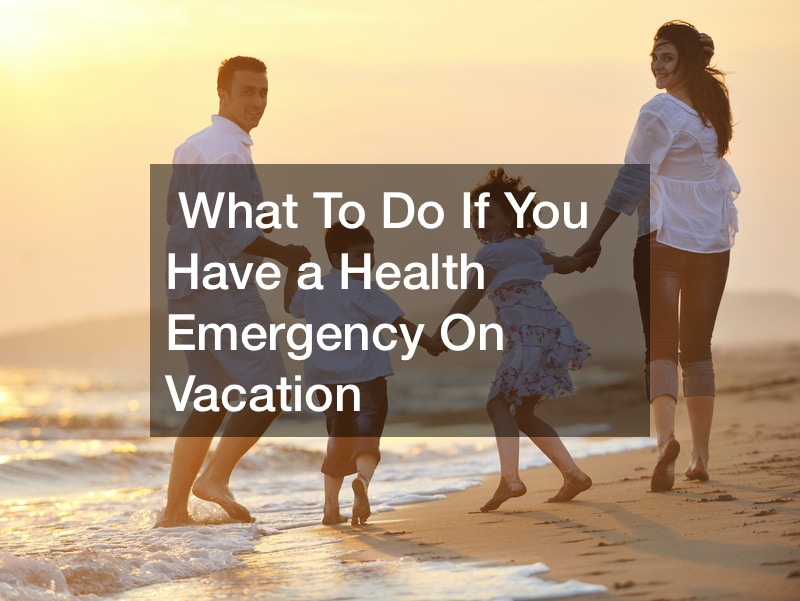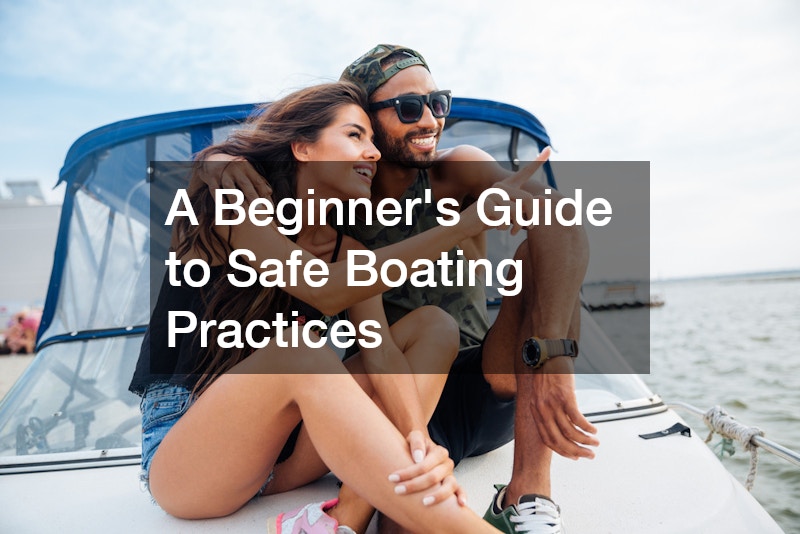
Vacations are supposed to be a time to relax and put away your worries and responsibilities. However, medical emergencies can still happen when you least expect them, and it’s important to have a plan in place so that you know how to handle any problems when you’re away from home. If you are planning a vacation this summer, here is what you need to know before heading out.
What to Know Before You Go

When it comes to knowing what to do in medical emergency situations, it’s important to begin putting together a plan well before you even start booking hotels or packing your bags.
Research
When you’ve decided where you want to vacation, take a moment to research the urgent-care centers, hospitals, clinics, and pharmacies in that area. This will give you a good idea of where you can seek help or treatment should something happen. Even something as simple as coming down with a cold can put a damper on your vacation activities. So getting something to help with your symptoms can be beneficial to helping you make the most of your trip.
If you’re going to be traveling with children, looking for a local child care program can also be helpful. If you or someone you are with falls ill or is injured and needs to go to the hospital, you may want to place your child in a care program so that they’re looked after while you take care of the situation. This will ensure that any young children will be kept safe if something happens when you’re on vacation.
If you use a hearing aid, you should also take note of the hearing healthcare services in your vacation area. If your hearing aid should break, you may need to seek assistance to help you get back to enjoying your time away.
Additionally, if you’re currently taking any prescriptions, knowing what local pharmacies are available can be helpful for getting needed refills. For instance, you might misplace your medications, lose them, or leave them at home. Instead of having to turn around and give up on your vacation — or risk going without your medication — you can have it easily refilled near you.
Bring Your Insurance Information and Health Information
When it comes to planning for what to do in medical emergency situations, it’s important to make sure that you have all your necessary information in case something happens. This is especially important if something happens and you are rendered unresponsive. By having your insurance and medical history information on you, you can ensure that you’ll get the appropriate care.
To make gathering everything easier, here is a shortlist of information you should have.
- A list of any known allergies, conditions, and dates of your latest immunizations
- The phone numbers of your primary care physician and dentist
- Your insurance ID cards
At the bare minimum, you should try to have all of this information in order before heading out on your vacation. You may even consider investing in additional healthcare coverage through travel insurance if you are traveling far away from home or to another country.
Make a Personal First Aid Kit
First aid kits are essential when learning what to do in medical emergency situations. While it’s a good idea to keep one in your car at all times, when it comes to traveling farther away from home, it’s a must-have. In your first aid kit, you should include:
- Basic over-the-counter pain relief and fever relief medications
- Extra prescription medications if they are available
- Medicine for upset stomachs
- Tweezers
- Gauze
- Medical tape
- Bandages
- Wipes
- Aloe vera for sunburns
- Cough drops
- Eye drops
- Instant heat/ice packs
These are must have’s in any first aid kit, and you’ll be amazed at how often they can come in handy. In addition to these items, you may want to consider bringing a personal safety shield or extra face masks in case you come down with something or go to an area that requires them.
If you use any mobility aids, you should also make sure that they are in good condition and that you have what you need to fix or replace them if they break while on vacation.
What to Do In Medical Emergency Situations While On Vacation

Once you have prepared all of the above, it’s time to start thinking about what you can do if something does go wrong while you’re away from home. To help prepare you, here is what you should keep in mind.
What You Should Do If Someone Gets Sick
If you or someone you are with falls ill while on vacation, what you do will depend on how sick they are. While minor colds may only require a visit to a local walk-in clinic, allergic reactions, fevers, and vomiting may require more urgent care.
If you made note of the local urgent care centers, you should seek assistance there to ensure that the illness isn’t severe. If an urgent care center isn’t available, you may want to seek aid at the local emergency room. If getting assistance is an emergency, don’t hesitate to call 911 immediately.
Additionally, if someone in your party isn’t feeling well, make sure to keep extra face masks on hand so that they can wear them while out in public. While it may not be necessary for all instances, it can go a long way towards helping mitigate the spread of illness in the area you’re vacationing in.
What You Should Do If Someone Is Injured
In cases of minor injuries such as small cuts or sunburns, you may be able to simply use your first aid kit and continue enjoying your vacation. However, deeper lacerations may require stitches, and it’s important to seek medical attention in cases like this. If you do suffer a deep cut or wound, do your best to staunch the bleeding with what is in your first aid kit and head to an urgent care center or call emergency services.
When it comes to what to do in medical emergency situations that involve injury, your first call should always be to 911. Whether it’s an injury caused by a personal accident or an injury caused by a car accident, you want to make sure that the problem is treated by a professional.
Car accidents, in particular, can be confusing to handle when on vacation. However, they should be handled much the same way you would back home. Make sure the police are called and that you alert your insurance company. If you are driving a rented car, speak with your rental service beforehand to make sure that insurance will cover any accidents that may happen.
If the accident was due to drunk driving on the part of the other driver, you should also consider getting a DUI attorney involved to ensure that any injuries and damages sustained to you will be covered by the other party and your insurance.
Make sure to always keep all documents regarding medical treatments so that you can have a record of what was done and the extent of your injuries. In the event of a car accident, you should also take photographs of the scene as evidence.
If the injury is severe and you are unable to respond or need to have an aerial lift to another hospital, make sure that someone in your group can coordinate your care. Designate someone in your party to be responsible for knowing where your insurance information and medical information is so that they can provide it to responders if you are unable to.
Dealing with Dental Injuries

Dental injuries are another type of injury that can occur in a multitude of ways. Car accidents, falls, chewing something hard, and getting hit in the mouth can all cause damage to your teeth. While minor chips may be put off until you can see your local dental care service back home, if your teeth are cracked, broken, or knocked out completely, you’ll need to see a dentist or orthodontist where you are.
If you lose a tooth during your vacation, try to salvage it the best you can by picking it up by the crown and rinsing it in cool water. If you can, try gently inserting it back into the socket and bite lightly on a piece of gauze to keep it in. If inserting it isn’t possible, keep the tooth moist by placing it in either milk or cool water. Call a local dentist and try to get in within 30 minutes to ensure that your tooth has the greatest chance of being saved.
If the tooth isn’t able to be saved, you should call your dentist back home and set up an appointment as soon as you get back. Missing teeth can cause a lot of additional problems, including bone loss and trouble eating. The gap can also cause other teeth to shift places, creating alignment problems. Orthodontics can help fix these problems with dental implant surgery.
Animal Injuries
When it comes to knowing what to do in medical emergency situations, you should also include pets in your plan. If you are planning on traveling with your furry friends, make sure to know where the closest 24 hour animal hospital is in your vacation location.
You should also make sure to have copies of your pet’s medical records. You can keep them alongside yours to make sure they don’t get lost. This will help the vet know of any ongoing problems and of any vaccinations that they’ve had recently.
You can even add some supplies for your fur friend to your first aid kit. Including a comfortable muzzle and some basics for an upset stomach and minor cuts, can also be essential. You may also want to include a blanket to protect them during transport and some extra water to ensure that they always stay hydrated.
Before heading out, you should also take care to ensure that the place you’re vacationing is friendly for pets. Some areas may be unsafe for pets or have chemicals around that may be hazardous to them. Always make sure to do this research beforehand so that you and your pet can have the best vacation possible.
Having a Safe and Enjoyable Vacation

Vacations are supposed to be stress-free and fun; however, it’s important not to throw caution to the wind. Before you leave, make sure that you have everything in order that can cover any medical emergencies that might spring up. You may even want to create a checklist to make sure you don’t accidentally leave anything behind.
If you’re going to be traveling with other people, consider coming up with a plan to designate different people to be in charge of medical information should the others be rendered unresponsive. While it may seem like a lot, it can be life-saving should the worst occur.
Additionally, if you’re planning on traveling with your pet, make sure that they have everything they need to stay safe and healthy. You may even want to speak with your pet to ensure that they’re okay with traveling. If they need any additional vaccinations, it’s a good time to get those as well.
With all of this in mind, you can start making the most of your time away from home without worrying about being caught without a plan during a medical emergency.
While no one wants to think about what to do in medical emergency situations while on vacation, taking care of these essentials now can give to the peace of mind you need to make the most of your time away from home.


